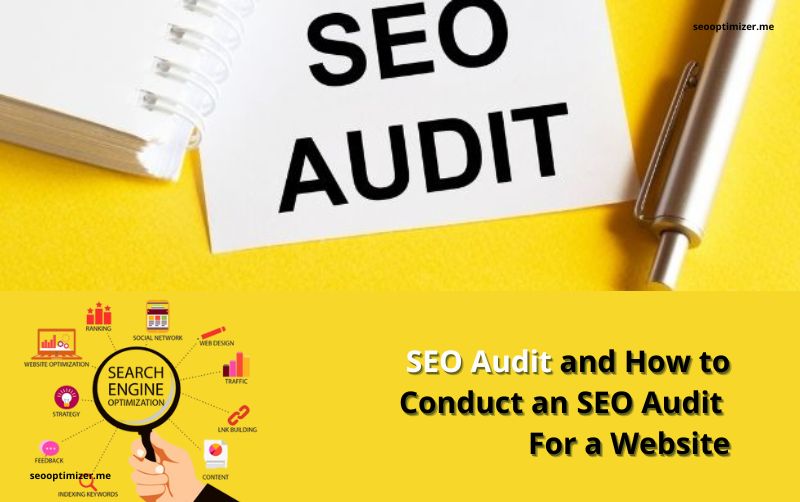SEO Auditing & How to Conduct an SEO Audit for a Website

Do you want to know how to conduct an SEO audit of your website, find SEO problems and get suggestions on how to solve them? If so, this article is for you! In this article, we'll cover everything you need to know about SEO audit and how to conduct one for your website.
Also read: The Significance of Mobile Optimization in SEO
What is SEO audit?
SEO audit is a process of analyzing a website to identify the areas that need improvement for better search engine ranking. It involves a comprehensive evaluation of a website's content, structure, and performance. The goal of an SEO audit is to uncover the issues that hinder the website's ranking on search engine result pages (SERPs) and provide actionable recommendations to fix them.
Suggested read: Beginners Guide to ON-Page SEO
Why is SEO Audit Important?
An SEO audit is crucial to ensure that your website is optimized for search engines. It helps you identify the areas that need improvement, such as technical issues, on-page optimization, content quality, and user experience. SEO audit is a crucial process that can help website owners to identify issues and opportunities to improve their website's ranking in search engine results pages (SERPs). The following are some reasons why SEO audit is important:
1. Improve Website Visibility
An SEO audit can help to identify website visibility issues and provide recommendations for improvement. This can help to increase the website's visibility in search engine results pages (SERPs), which can lead to more traffic and potential customers.
2. Identify Technical Issues
An SEO audit can also help to identify technical issues that may be impacting the website's performance. This can include issues such as broken links, slow page speed, duplicate content, and other technical issues that can negatively impact the website's ranking in search engine results pages (SERPs).
3. Identify Keyword Opportunities
An SEO audit can also help to identify keyword opportunities that the website may be missing out on. By analyzing the website's content, an SEO audit can help to identify keywords that the website is currently not targeting, but that could be valuable for improving the website's ranking in search engine results pages (SERPs).
4. Stay Ahead of Competitors
An SEO audit can help website owners to stay ahead of their competitors by identifying areas where the website can be improved. By identifying areas for improvement, website owners can take action to improve their website's ranking in search engine results pages (SERPs) and stay ahead of their competitors.
Also read: 11 Ways to Measure the Success of your SEO Strategy
How to Conduct an SEO Audit of a Website
Conducting an SEO audit of a website involves analyzing various factors that can impact the website's ranking in search engine results pages (SERPs). The following are some steps that can be taken to conduct an SEO audit of a website:
1. Use an SEO Audit Tool
Using an SEO audit tool can help to simplify the process of conducting an SEO audit. Some popular SEO audit tools include Ahrefs, SEMrush, Moz, and Google Search Console.
2. Analyze your content
Your website's content is the foundation of your SEO strategy. Analyzing your content involves assessing its quality, relevance, and engagement. This includes evaluating your blog posts, landing pages, product pages, and other content on your website. You can use tools like Grammarly, Copyscape, and BuzzSumo to evaluate your content.
3. Analyze Website Traffic
Analyzing website traffic is an important first step in conducting an SEO audit. This involves analyzing data from tools such as Google Analytics to identify traffic patterns and areas for improvement.
4. Identify Keyword Opportunities
Identifying keyword opportunities is another important step in conducting an SEO audit. This involves analyzing the website's content and identifying keywords that the website is currently not targeting, but that could be valuable for improving the website's ranking in search engine results pages (SERPs).
5. Analyze On-Page SEO Factors
Analyzing on-page SEO factors is another important step in conducting an SEO audit. This involves analyzing factors such as title tags, meta descriptions, header tags, and other on-page factors that can impact the website's ranking in search engine results pages (SERPs).
Recommended: 8 Essential Web & SEO Tools for Auditing and Monitoring Websites
Also read: The Role of Backlinks in SEO and How to Acquire Them
6. Analyze Off-Page SEO Factors
Analyzing off-page SEO factors is also an important step in conducting an SEO audit. This involves analyzing factors such as backlinks, social media signals, and other off-page factors that can impact the website's ranking in search engine results pages (SERPs).
7. Identify Technical Issues
Identifying technical issues is another important step in conducting an SEO audit. This involves analyzing factors such as page speed, broken links, duplicate content, and other technical issues that can impact the website's ranking in search engine results pages (SERPs).
8. Evaluate user experience
User experience is a critical factor that impacts your website's SEO. Analyzing user experience involves assessing your website's usability, accessibility, and engagement. This includes evaluating your website's design, navigation, call-to-actions, and other factors that impact user experience. You can use tools like Hotjar, Google Analytics, and Crazy Egg to evaluate your website's user experience.
9. Create an SEO audit report
The final step in conducting an SEO audit is to create an SEO audit report. This report should include a summary of your findings, recommendations for improvement, and an action plan to implement the recommendations. The report should also include a timeline for implementing the recommendations and a process for monitoring the progress.
Also read: Best Guide for Keywords Usage in SEO
What's Next –
Start SEO Optimization, Audit your website for Free - SEO audit free
Analyze your website with Free SEO Optimizer
Suggested reads:
Also read: SEO for Beginners – Ultimate Guide
Also read: RoadMap to Becoming An SEO Expert
Also read: 15 Top SEO Experts and Specialists
Also read: AI SEO – The Impact of Artificial Intelligence on SEO Strategies
Also read: Google Indexing and How Web Crawler Works
seo audit, seo auditing, seo, seo analyzer, seo optimizer, seooptimizer, seoanalyzer, seo audit free




